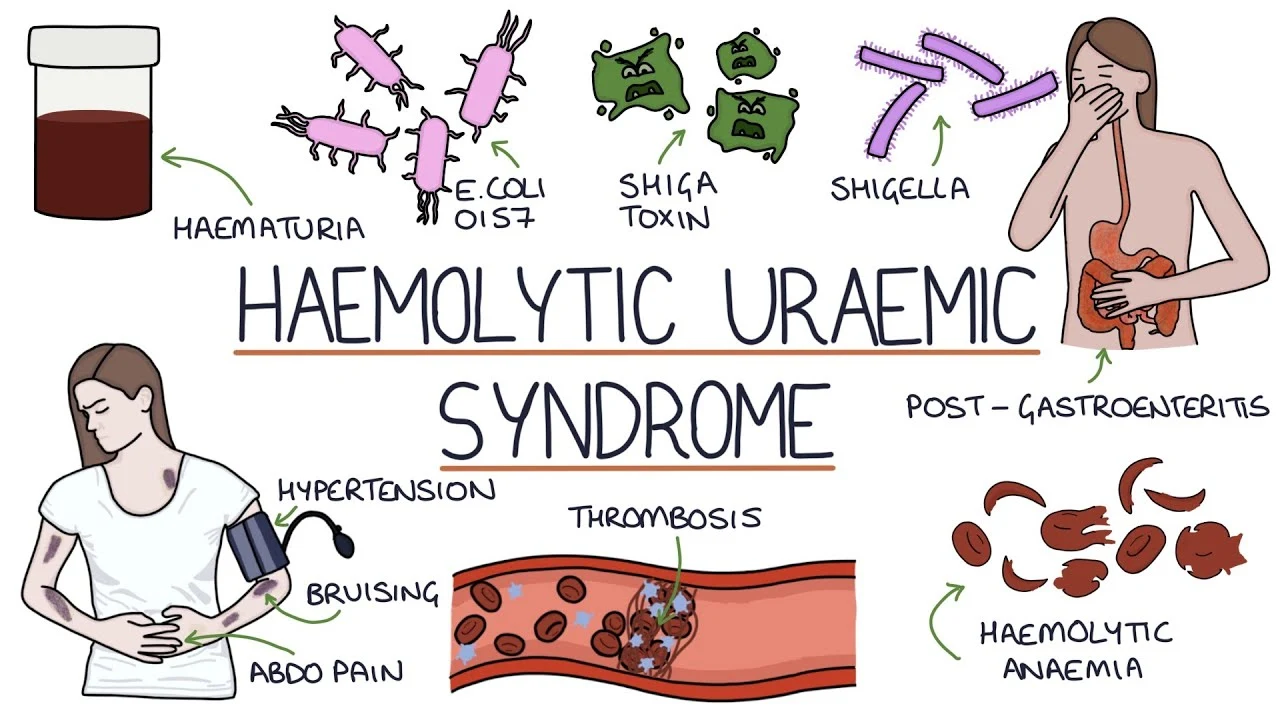How is hemolytic-uremic syndrome treated?
Houston Endocrine Center2023-02-10T12:55:14+00:00Hemolytic-uremic syndrome (HUS) is a rare disease that can be life-threatening in children. An infection is often caused by a specific type of bacteria called Shiga toxin-producing Escherichia coli (STEC) or another germ called Campylobacter jejuni. HUS causes blood cells to break down and may lead to kidney failure.

There’s no cure for HUS, but your healthcare provider can treat it with several types of medication and supportive care at home. In some cases, children with HUS will need to stay in the hospital for about two weeks until their symptoms get better or
completely disappear.
What are the symptoms of HUS?

Hemolytic uremic syndrome is a serious condition characterized by kidney failure, anemia, and low platelet count. Symptoms of the hemolytic uremic syndrome include:
- Diarrhea
- Nausea
- Vomiting
- Fever
- Weakness or fatigue
- Jaundice
What tests will be done to diagnose HUS?

- Blood test: Hemolytic uremic syndrome is usually diagnosed through a blood test. The doctor will look for certain red blood cells and antibodies. Antibodies are proteins your immune system makes to help fight off infections, so finding them means you have an infection somewhere in your body.
- Urinary tests: Your doctor may also do a urine test on you to check for the hemolytic uremic syndrome. They’ll look for hemoglobin (the protein from red blood cells) in your urine and creatinine levels (a waste product) to see how much kidney damage has occurred.
- Liver function tests: Liver function tests can also be used as an early detection method for hemolytic uremic syndrome because they often show signs of liver damage before other symptoms become apparent. These include bilirubin levels—which measure whether there’s too much bilirubin being produced—and alanine aminotransferase (ALT), another enzyme related to liver damage and disease development. If these levels are high, but other factors aren’t present yet, then it could mean that HUS may develop soon after treatment begins or hasn’t gone away completely yet if the treatment didn’t work the first time properly.
How is hemolytic uremic syndrome treated?

There is no cure for HUS. Treatment focuses on managing symptoms, preventing complications, and improving quality of life.
HUS treatment may include:
- Careful monitoring of fluid intake and output
- Blood transfusions, if needed to replace lost blood volume or pressure inside your blood vessels (acute kidney failure)
- Kidney dialysis to remove wastes from your bloodstream (acute kidney failure)
- Intravenous immunoglobulin to reduce the risk of kidney failure (acute kidney failure)
- Monitoring of kidney function and electrolytes. If necessary, surgery to remove damaged tissue from your gastrointestinal tract (intestinal perforation)
- In children, HUS is usually treated with IVIG alone. If your child needs dialysis or kidney transplantation, starting these treatments as soon as possible is important.
- In adults, treatment often includes IVIG and plasma exchange, as well as dialysis or kidney transplantation.
If you have HUS and your symptoms are severe, you may need to be hospitalized. You’ll likely receive fluids through a vein (intravenous) while your kidneys recover.
Your doctor may also give you medications to control blood pressure and reduce swelling around the heart and brain.
What medications are used to treat HUS?

Your doctor may recommend several different medications to treat the hemolytic uremic syndrome. These include:
- Blood transfusions
- Plasma exchange
- Kidney dialysis (if your kidneys are damaged)
- Antibiotics to treat bacterial infections and diarrhea
Can you recover from hemolytic uremic syndrome?
Yes, you can recover from the hemolytic uremic syndrome. Most people do recover with no lasting complications, but there is a chance that you may need a kidney transplant later on in life.
How long it takes to recover depends on the severity of your illness and how quickly your body can heal itself. Some people recover quickly, while others need more time to return to their daily activities. The speed at which your body heals itself may depend on how soon after the HUS you start feeling better again and resume eating solid food—if they don’t eat enough when they first come out of the hospital, it could take longer to start feeling better again.
The recovery process also depends on how quickly their kidneys can work again—if HUS damaged their kidneys, then this will take longer than if only one were affected during initial treatment with IVIG or plasmapheresis.
It is also important for people with HUS to eat a balanced diet and drink plenty of fluids so that their kidneys can flush out waste products from the bloodstream and keep working properly.
How can I prevent hemolytic uremic syndrome?

- Wash your hands before eating.
- Wash fruits and vegetables before eating them.
- Do not drink water from a stream or pond.
- Do not swim in a lake or river.
- Avoid drinking unpasteurized milk, which can contain E. coli bacteria that can cause the hemolytic uremic syndrome.
Conclusion
Hemolytic uremic syndrome is a serious condition that can be life-threatening. Contact a doctor immediately if you or someone you know is experiencing symptoms. Treatment options range from supportive care to dialysis and transplantation. The best way to prevent hemolytic uremic syndrome is to eat well, drink plenty of water, and wash your hands often.
